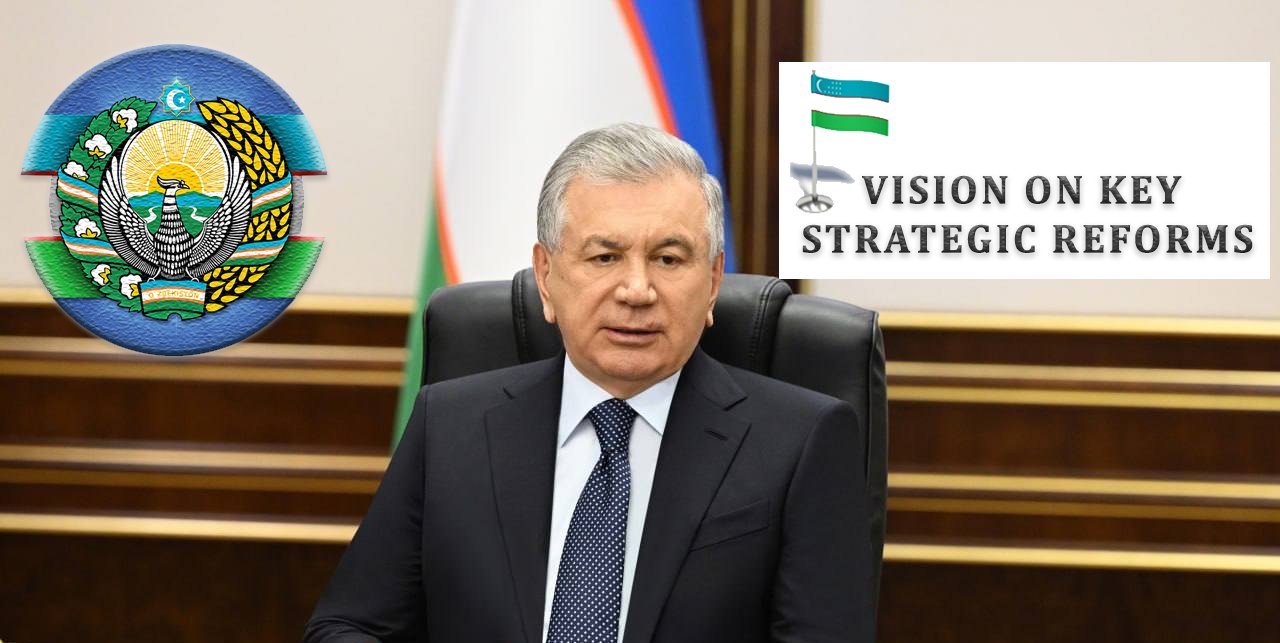by: Mr. Khalid Taimur Akram, Executive Director, Pakistan Research Center for a Community with Shared Future (PRCCSF), Islamabad:
Uzbekistan President Shavkat Mirziyoyev outlined his strategic vision for the future trajectory of Uzbekistan on February 13, 2024, emphasizing the crucial need for swift implementation of significant reforms. He called for the fulfilling the completion of all stages of forming the foundation of a market economy.
The comprehensive presentation delves into reforms across five pivotal spheres: transport, urbanization, entrepreneurship, agriculture, and energy, wherein lies the recognition of the indispensable role of leveraging transport opportunities in fueling economic advancement, particularly in light of Uzbekistan’s geographical location from major sea routes. These reforms are seen as indispensable in leading Uzbekistan’s economy towards new horizons and ensuring its continued progress.
These reforms encapsulate the ambitious objectives encapsulated within the “Uzbekistan 2030” strategy, which sets forth the ambitious goals of achieving a GDP of $160 billion and a per capita income of $4,000 by 2030. The president underscored plans to embark on 122 large-scale investment projects totaling $50 billion aimed at fortifying the energy infrastructure to meet the anticipated 1.5-fold surge in energy demand, all underscored by the overarching imperative to fortify the legal framework and provide requisite investor guarantees, thus instilling confidence and catalyzing private sector participation, with particular emphasis on the transfer of select state functions to private companies to optimize operational efficiencies and unlock latent potential.
The president also stressed the indispensable need to ensure ubiquitous access to high-quality internet across regions to catalyze advancements in financial services, e-commerce, e-learning, and healthcare, underscored by a planned expansion of cities and districts with populations exceeding 300,000 from 13 to 28.
The formulation of a comprehensive legislative framework and conceptual strategy to regulate urbanization processes and mitigate uncontrolled urban sprawl that threatens to encroach upon precious agricultural lands. Agriculture’s pivotal role in ensuring food security and generating employment opportunities, and hence advocating for targeted interventions aimed at enhancing productivity, reducing production costs, and fostering innovation within the sector, while concurrently emphasizing the paramount importance of ensuring a reliable energy supply to sustain burgeoning economic activities.
The steadfast continuation of economic transformation processes and commitment to enhancing the business ecosystem by describing the clear guidelines for public-private partnerships across diverse sectors encompassing infrastructure, education, healthcare, and beyond, coupled with the imperative to devise a robust project portfolio in collaboration with industry and regional stakeholders to drive sustainable economic growth and foster entrepreneurial dynamism, thus cultivating an environment conducive to business investment.
Key development programs: With the implementation of the New Uzbekistan 2022–2026 strategy, President Shavkat Mirziyoyev spearheads progressive initiatives aimed at shaping a more prosperous and inclusive Uzbekistan. Uzbekistan has made significant strides in this arena, notably halving its poverty level since 2017. With an unwavering dedication to leaving no one behind, Uzbekistan diligently implements programs geared towards enhancing human capital and fostering social inclusion, epitomizing its approach to sustainable development through a comprehensive strategy that encompasses economic, social, and environmental dimensions.
Under the visionary guidance and endorsed by the President Shavkat Mirziyoyev the “Uzbekistan 2030” strategy charts a forward-looking path towards substantial improvements in renewable energy, ecological sustainability, economic growth, and social welfare. This holistic approach to national development emphasizes sustainability and economic diversification, encapsulated within the broader “Uzbekistan-2030” strategy, wherein key economic goals are delineated, including ensuring GDP growth of not less than 6% and maintaining investments at a minimum of 30% of GDP, alongside the ambitious launch of 309 large-scale projects valued at $18 billion across various economic sectors. The crucial plans for important strategic reforms are poised to actualize the objectives set forth within both the New Uzbekistan 2022–2026 strategy and the Uzbekistan-2030 strategy.
The country’s steadfast commitment to realizing its full potential and assuming a prominent position on the global stage is exemplified by its proactive engagement in fostering technological innovation and economic progress. President Mirziyoyev’s pivotal role in fostering socioeconomic connections and positioning Uzbekistan as a key player in the international arena, with its proactive development policies contributing to the enhancement and fostering mutually beneficial partnerships, thereby exemplifying Uzbekistan’s steadfast commitment to realizing its aspirations of becoming one of the key economies on the global stage, as evidenced by its sustained economic growth trajectory, proactive engagement with regional and international partners, and unwavering commitment to fostering inclusive and sustainable development. President Shavkat Mirziyoyev’s is leading Uzbekistan towards a brighter, more prosperous future.





